Читать книгу Great Britain: geography, politics, culture - Л. А. Ласица - Страница 12
На сайте Литреса книга снята с продажи.
2 History of Britain: from Early Britain to the Middle Ages
2.5 The Middle Ages. The Anglo-Saxon Conquest of Britain
ОглавлениеAfter the Roman legions left Britain the Celts remained independent but not for long. From the middle of the 5th century they had to defend the country against the attacks of Germanic tribes from the Continent. The Saxons and the Angles began to migrate to Britain. At first they only came to plunder. They landed from their boats, drove off the cattle, seized the stores of corn, and were off again to sea before the Celts could attack them. But after some time they returned again and again in larger numbers, and began to conquer the country.
The British natives fought fiercely against the invaders and it took the Angles and the Saxons more than a hundred and fifty years to conquer the country. The Celts went to the mountains in the west of the isle (now Wales) and settled there. In the course of the conquest many of the Celts were killed, some were taken prisoners and made slaves or had to pay tribute to the conquerors.
In the southern and the south-eastern parts of the country the Saxons formed a number of kingdoms – Sussex (the land of the South Saxons), Wessex (the land of the West Saxons, and Essex (the land of the East Saxons). Further north were the settlements of the Angles who had conquered the greater part of the country. In the North they founded Northumbria, Mercia was formed in the Middle, and East Anglia – in the east of England. The new settlers disliked towns, preferring to live in small villages. During the war they destroyed the Roman towns. The art of road-making was lost for many hundreds of years.
The Saxons and the Angles gradually united into one people and made up the majority of the population in Britain. Their customs, religion and language became predominant. Only the Celts who remained independent in the West, Scotland and Ireland spoke their native tongue. The conquerors called them ‘welsh’ which means foreigners.
In 829 under the rule of King Egbert all the small Anglo-Saxon kingdoms were united to form one kingdom which was called England from that time on.
Soon Anglo-Saxons had to defend their country against new enemies. The enemies were the Vikings who came from Scandinavia. In the 9th century they settled the extreme north and west of Scotland and some coastal regions of Ireland. King Alfred, Saxon king of Wessex fought them in the battle, but he couldn’t drive them away and had to let them have part of the country, called Danelaw.
